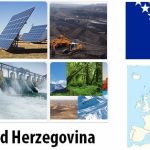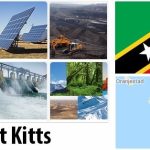Natural resources and energy
Austria has relatively few natural resources besides hydropower and timber. Smaller assets are found from, among others, iron ore and magnesite, as well as oil, natural gas and lignite.
Iron ore is the most important mineral resource and is extracted in two open quarries in Styria. Austria is one of the world’s largest producers of magnesite and tungsten, although the extraction is not so great. There are also deposits of plaster, graphite, quartz, limestone, talc and salt.
- COUNTRYAAH: Major exports by Austria with a full list of the top products exported by the country. Includes trade value in U.S. dollars and the percentage for each product category.
Oil and natural gas have been mined in the Wienerbäckenet since the 19th century. The amount of oil and natural gas produced today is relatively modest and covers only 10–15 percent of the domestic demand. The last lignite mine was closed in 2006.
The partially state-owned energy giant OMV (formerly ÖMV) accounts for most of the domestic production of oil and gas and is also an importer. In recent years, OMV has bought into markets in Eastern and Central Europe as well as in Turkey.
- Abbreviationfinder: A popular acronym site in the world covering abbreviation for each country. For example, AT stands for Austria. Visit itypeusa for more information about Austria.
Hydropower from several hundred power plants in the rivers accounts for about 60 percent of electricity generation. The use of other renewable energy sources such as biofuels and wind and solar power is also increasing rapidly.
A nuclear power plant was built in the 1970s but was never put into operation: in a 1978 referendum, 50.5 percent of voters said no to nuclear power. Austria has since worked for a Central Europe without nuclear power.
Most of the total energy demand is covered by imports. A large part of gas imports come from Russia.
FACTS – ENERGY AND ENVIRONMENT
Energy use per person
3 802 kilos of oil equivalents (2015)
Electricity consumption per person
8361 kilowatt hours, kWh (2014)
Carbon dioxide emissions in total
58 712 thousand tons (2014)
Carbon dioxide emissions per inhabitant
6.9 tons (2014)
The share of energy from renewable sources
34.4 percent (2015)
2016
December
FPÖ candidate loses presidential election
December 5
Alexander Van der Bellen wins the presidential election with about 53 percent of the vote, against about 46 percent for Norbert Hofer from FPÖ.
September
Presidential elections are postponed
September 12
Problems with election envelopes that cannot be closed due to insufficient glue mean that the presidential election, which was held on October 2, will be moved to December 4.
July
Trial is pending against ex-finance minister
July 21st
Prosecutors announce charges against Karl-Heinz Grasser, who was finance minister in the bourgeois government from 2000 to 2007 and who is accused of fraud and corruption in connection with the sale of apartments from the state-owned real estate company Buwog (see Modern history). The trial is expected in 2017.
The National Council takes over the presidency
July 8
President Fischer’s term of office expires. The presidency is temporarily taken over by Parliament’s Lower House (National Council) Bureau under the leadership of Doris Bures.
New presidential election in October
July 5
The second round of the presidential election will be held on October 2.
The presidential election is rejected
July 1st
The Constitutional Court decides that the second round of presidential elections must be reassigned. The Court finds no evidence of cheating, but on the other hand, there were so many errors in dealing with the approximately 700,000 postal votes that the final result can be called into question. According to the court, 78,000 voting envelopes were opened in 14 districts prematurely, which according to the court may have allowed cheating. By the court’s ruling, Van der Bellen cannot take office on July 8 as planned. Current President Fischer resigns when his term expires but is replaced by a provisional council of parliamentarians.
June
FPÖ questions election results
June 16
Representatives of the FPÖ turn to the Constitutional Court because they believe that mistakes were made in connection with the vote. The court has four weeks to investigate the case.
May
Even presidential elections
May 23
Both candidates for the presidential post, FPÖ’s Norbert Hofer and Alexander Van der Bellen of the Greens, both get around 50 percent of the vote when the voting is largely completed. Only when the postal votes have gone through, it is clear that Van der Bellen won by only 31,000 votes over Hofer.
Christian Kern becomes new Chancellor
May 17
Kern is a social democrat like Faymann. He conducts a government reform in connection with the entry.
Chancellor Faymann resigns
May 9
Vice Chancellor Reinhold Mitterlehrer temporarily takes over the post of head of government. Werner Faymann also resigns as party chairman for SPÖ (see further Current policy).
April
Parliament adopts new immigration law
April 27
The law is considered to be one of Europe’s toughest and allows the government to proclaim emergency permits if the number of migrants increases and also to reject asylum seekers directly at the border.
FPÖ’s candidate wins first round of presidential election
April 25
Norbert Hofer receives 35 percent of the vote. In the second round, he will meet De Greens’ Alexander Van der Bellen, who gets 21 percent. An independent candidate, Irmgard Griss takes home 19 percent, while the candidates from SPÖ and ÖVP receive only 11 percent each.
Theater set with refugees stormed by right-wing extremists
About 30 supporters of the right-wing extremist movement Identitaere cancel an ongoing play at a theater in Vienna where the actors are refugees. The right-wing extremists spray blood on the audience.
February
Limitation for asylum seekers
January 19
The Government introduces new restrictions on refugee reception. Per day, a maximum of 80 migrants should be allowed asylum in the country and a maximum of 3,200 people will be allowed to pass through the country on their way to northern Europe.
January
Asylum applications have tripled
January 21st
The Government announces that a ceiling for the refugee reception should be set at approximately 37,500 refugees annually over the next four years. In 2015, 90,000 asylum seekers in Austria, compared with 28,000 the year before.











